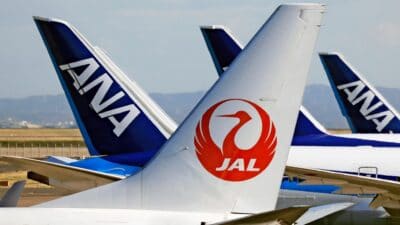b हॉटेल उद्योगासाठी विशेष आव्हाने
स्कोप 3 उत्सर्जनाची सामान्य उपयुक्तता आणि तुलनेबद्दलच्या चिंतेसोबतच, स्कोप 3 चे संकलन आणि पडताळणी हे हॉटेल उद्योगासाठी अनन्यसाधारणपणे आव्हानात्मक आहे.
नियम GHG प्रोटोकॉलमध्ये नमूद केल्यानुसार स्कोप 15 उत्सर्जनाच्या 3 श्रेणी ओळखतो, ज्यातील बहुतांश वरील चर्चा केल्याप्रमाणे व्यवस्थापन आणि फ्रेंचायझी मॉडेलचा प्रसार पाहता तृतीय पक्षांवर भिन्न प्रमाणात अवलंबून असेल. खरंच, SEC ने नियमात जेवढे मान्य केले आहे ते असे नमूद केले आहे की "नोंदणी करणार्याच्या स्कोप 3 उत्सर्जनाची गणना करण्यासाठी आवश्यक डेटा प्राप्त करणे आव्हानात्मक असू शकते कारण बहुतेक डेटा तृतीय पक्षांच्या नियंत्रणाखाली असण्याची शक्यता आहे."
आमच्या सदस्यांसाठी सर्वात चिंतेची बाब म्हणजे खालील गोष्टींचा समावेश करणे:
- नोंदणी करणार्याचे "फ्रेंचायझी" आणि
- स्कोप 3 क्रियाकलापांच्या सूचीमध्ये "खरेदी केलेल्या वस्तू आणि सेवा".
आम्ही प्रत्येकाला क्रमाने संबोधित करतो.
फ्रेंचायझी आणि व्यवस्थापन कंपन्यांकडून संकलन
नोंदणीकर्त्यांना त्यांच्या स्कोप 3 प्रकटीकरणाचा भाग म्हणून फ्रँचायझींकडून उत्सर्जनाचा समावेश करणे आवश्यक असल्याने हॉटेल ब्रँड, REITS आणि इतर मालकांसाठी महत्त्वपूर्ण आव्हाने आहेत.
वरील पार्श्वभूमी विभागात वर्णन केल्याप्रमाणे, त्यांची विशिष्ट संस्थात्मक रचना भिन्न असू शकते, आमचे बरेच सदस्य त्यांचे गुणधर्म चालवण्यासाठी तृतीय पक्षांवर जास्त अवलंबून असतात.
अशा नोंदणीकर्त्याला त्याचे स्कोप 3 उत्सर्जन उघड करणे आवश्यक असल्यास, त्यांना फ्रँचायझी किंवा व्यवस्थापन कंपनीकडून डेटा प्राप्त करणे आवश्यक आहे, ज्यांना ते स्वतः हॉटेलला वस्तू आणि सेवा प्रदान करणार्या स्थानिक व्यवसायांकडून प्राप्त करणे आवश्यक आहे.
फ्रेंचायझी आणि व्यवस्थापन कंपन्या AHLA च्या एकूण सदस्यत्वाचा अर्थपूर्ण भाग आहेत. या कंपन्या अनेकदा लहान आणि खाजगीरित्या चालवल्या जातात आणि त्या SEC च्या प्रकटीकरण आवश्यकतांच्या अधीन नसतात.
हवामान प्रकटीकरण प्रक्रियेत या संस्थांना कोणती भूमिका बजावावी लागेल आणि सार्वजनिक फाइलर नसतानाही त्यांच्यावर लादल्या जाणार्या ओझेंबद्दल आम्ही अनन्यपणे चिंतित आहोत. हॉटेलच्या दैनंदिन कामकाजावर देखरेख करणार्या संस्था म्हणून, ते मालमत्तेवर भरीव नियंत्रण ठेवतात, त्यात ऊर्जा खरेदी आणि वापर यांचा समावेश होतो, जरी कराराच्या अटींवर अवलंबून मर्यादा बदलते.
त्यांच्या सार्वजनिक कंपनीच्या अहवालाच्या जबाबदाऱ्या पूर्ण करण्यासाठी, सार्वजनिक हॉटेल ब्रँड आणि REIT ला हवामान-संबंधित डेटासाठी हॉटेल फ्रँचायझी आणि ऑपरेटरवर अर्थपूर्णपणे अधिक मागणी करण्याची आवश्यकता असू शकते.
हे डायनॅमिक नोंदणीकर्ते आणि ते ज्यांच्यावर अवलंबून असतात अशा तृतीय पक्षांसाठी संकलनात गंभीर अडथळे निर्माण करतात.
प्राथमिक चिंतेची बाब अशी आहे की अनेक फ्रँचायझी आणि व्यवस्थापन कंपन्यांकडे डेटा संकलन आणि अहवाल कार्यक्रम राबविण्यासाठी आणि देखरेखीसाठी आवश्यक संसाधने आणि कर्मचारी यांची कमतरता आहे आणि SEC च्या प्रस्तावित प्रकटीकरण प्रणालीचे समाधान करण्यासाठी सार्वजनिक मालक आणि ब्रँडसाठी आवश्यक असलेल्या ग्रॅन्युलॅरिटीची आवश्यकता आहे.
स्कोप 3 उत्सर्जनाची गणना आणि प्रकटीकरण करण्यासाठी आवश्यक डेटा प्राप्त करण्यासाठी आमच्या ब्रँड/मालक सदस्यांकडून समन्वय आणि देखरेखीची पातळी आवश्यक आहे जी असमर्थनीय आहे, विशेषत: जगभरातील शेकडो किंवा हजारो मालमत्ता असलेल्यांसाठी.
डेटाचे प्रमाणीकरण आणि विश्वासार्हता ही समान चिंतेची बाब आहे कारण, पुन्हा, या तृतीय-पक्ष संस्थांकडे SEC फाइलिंगसाठी पुरेशा निश्चिततेच्या कोणत्याही स्तरावर या आकडेवारीचे प्रमाणीकरण करण्यासाठी संसाधने असण्याची शक्यता नाही.
आमचे मोठे नोंदणी सदस्य ज्यांनी स्कोप 3 कपात लक्ष्यांसाठी वचनबद्ध केले आहे ते अजूनही त्यांचे डेटा संकलन आणि प्रमाणीकरण प्रक्रिया सुधारण्यासाठी काम करत आहेत.
या नियमांतर्गत अन्यथा कोणतेही कर्तव्य नसलेल्या लहान, खाजगी व्यवसायांकडून समान पातळीची अचूकता आवश्यक असणे अत्यंत कठीण आहे आणि काही प्रकरणांमध्ये ते साध्य करणे अशक्य आहे. कठीण श्रमिक बाजारामुळे, आमचे बरेच सदस्य त्यांच्या हॉटेलमध्ये खुल्या जागा भरण्यासाठी धडपडत आहेत, ज्यामुळे हॉटेल असोसिएट्ससाठी अगदी मूलभूत हॉटेल सेवा प्रदान करणे अधिक आव्हानात्मक बनले आहे.
आर्थिक अहवालासाठी आवश्यक स्तरावर स्कोप 1 आणि स्कोप 2 डेटाचा अचूकपणे मागोवा घेतल्याने त्या कामाचा ताण वाढेल.
स्कोप 3 उत्सर्जन संकलित आणि प्रमाणित करण्याच्या आवश्यकतेवर स्तर केल्याने त्या सहयोगींवर एक अवाजवी भार पडेल आणि काही हॉटेल्सना अतिरिक्त कर्मचारी नियुक्त करण्याची देखील आवश्यकता असू शकते, सध्याच्या कामगार बाजारपेठेतील एक आव्हानात्मक आणि महाग शक्यता आहे.
वस्तू आणि सेवा पुरवठादारांकडून संकलन
आमच्या सदस्यांना त्यांच्या स्कोप 3 उत्सर्जनाचा अहवाल देणे, डेटा संकलन, आणि नोंदणीकर्त्याने खरेदी केलेल्या वस्तू आणि सेवांसाठी पडताळणी करणे व्यावहारिकदृष्ट्या अशक्य आहे.
Purchased goods and services can frequently be one of the larger Scope 3 categories for many hotels.
Cleaning services, transportation, food, supplies, and entertainment represent broad categories encompassing hundreds if not thousands of individual emissions that make up a registrant’s Scope 3 inventory.
Regardless of ownership structure, category, or class, all our members rely heavily on a broad network of suppliers and vendors to support their hotels.
Access to supply chain information across the hotels within the U.S. is already challenging, but members who are global companies also are faced with added complications of supply chains for hotels based all over the world.
Further, the suppliers our members depend on are overwhelmingly small, local companies that have been hit the hardest during the pandemic and continue to struggle amidst current labor trends. Like private operators and franchisees, these entities would not be subject to the SEC’s disclosure regime but for their contractual relationships with our public members.
While many of our members have pursued these local and diverse sourcing practices for decades, others have more recently embraced similar commitments as part of their broader Diversity, Equity, and Inclusion (DEI) efforts.
Similarly, travel and tourism companies are exerting increasing pressure on hotels to support local destinations by buying local and supporting small businesses.
Given their small, private structure, such suppliers overwhelmingly lack the resources, staff, and expertise to provide registrants with the extensive amount of reliable Scope 1 and Scope 2 emissions data that our members would be comfortable submitting as part of their SEC filings.
Indeed, many of these suppliers are located all across the globe in countries that may be years behind on any climate-related requirements.
Further, registrants may feel pressured to shift their purchase of goods and services to larger, more established entities with the resources and capacity to track and report this data with a higher level of assurance.
Scope 3 methodologies are still evolving and, as discussed above, there are significant practical limitations on our members’ ability to collect and assess Scope 3 emissions data at the level required by the Rule for properties that they do not own and/or operate.
AHLA, therefore, requests that the SEC eliminate the requirements to disclose all Scope 3 emissions. If SEC-mandated Scope 3 reporting is required at all, this data should be furnished in a separate report, rather than filed and a longer compliance period should be permitted to align disclosures with the available data (9-12 months after each calendar year).
Doing so would encourage registrants to develop and refine their Scope 3 collection programs without the added burden and associated liability of filing these figures.
2. आवश्यकतेच्या स्तरांची किंमत निषिद्ध असेल आणि AHLA सदस्यांना मिळणे जवळपास अशक्य असेल; SEC ने सर्व आवश्यक आश्वासने काढून टाकली पाहिजेत.
The Rule includes a proposed phased approach for a registrant to file an attestation report covering its Scope 1 and 2 emissions. It begins by requiring large accelerated filers to provide “limited assurance” of their emissions beginning Year 2, then expands to require “reasonable assurance” for Year 4 and beyond.
Registrants would also be required to use a service provider that satisfies specified qualifications and includes certain disclosures about the provider.
Obtaining “limited assurance” is a time- and resource-intensive process that would consume a large proportion of our members’ sustainability budgets.
Demanding “reasonable assurance” would impose a much higher bar for registrants to achieve, requiring significantly more resources and increased costs.
Our members are already facing challenges procuring the necessary support, a challenge that will likely be exacerbated as the Rule produces an influx of new companies that are required to provide these reports in their filings.
While AHLA fully supports the goal of ensuring the data reported is as reliable and comparable as possible, obtaining the levels of assurance required by the Rule would impose unreasonable burdens on our members and is nearly impossible for our members to obtain in the timeframe articulated in the Rule.
We, therefore, believe the SEC should eliminate all required assurances or, at the most, require attestation reports that provide “limited assurance” beginning Year 4.
Financial Statement Metrics
3. गंभीर हवामानाच्या घटनांचा पूर्ण परिणाम आणि निर्दिष्ट लाइन आयटमवर संक्रमण क्रियाकलाप उघड करण्यासाठी 1% थ्रेशोल्डसाठी अचूकतेची पातळी आवश्यक आहे जी अव्यवहार्य आहे आणि गुंतवणूकदारांना मौल्यवान माहिती प्रदान करणार नाही; SEC ने ही आवश्यकता पूर्णपणे काढून टाकली पाहिजे.
For consolidated financial statements that would otherwise be included in the Rule’s specified disclosure forms, registrants must include a note describing the financial impact of severe weather events, transition activities, and any mitigating expenditures and opportunities on a relevant line item if the absolute value of those impacts is 1% or more of the total line item.
Performing such a precise calculation, particularly for impacts inherently based on extensive estimates and assumptions, would be nearly impossible to achieve even for our largest members.
In addition, the standard does not track with the materiality principle which is used for all other financial statement footnotes and underpins the rest of the requirements in the Rule.
The amount of judgment and estimation required to determine if an event or activity was climate-related, let alone whether it would have a 1% impact, would be excessively costly, practically impossible, and would not ultimately yield decision-worthy information for investors.
The concepts targeted in these line item impacts are better served outside the pages of our members’ financial statements. AHLA, therefore, urges the SEC to eliminate the line item disclosure requirement entirely.
If the requirement is retained in some fashion, the relevant measure should be materiality consistent with all other requirements in the Rule, not an arbitrary percentage.
4. SEC ने हवामान-संबंधित खर्च, जोखीम आणि संक्रमण क्रियाकलाप काय समाविष्ट आहे यासह नोंदणीकर्त्यांनी अहवाल देणे आवश्यक असलेल्या मुख्य संकल्पनांवर अधिक स्पष्टता प्रदान केली पाहिजे.
If the SEC requires registrants to include the impact of climate-related events in their financial statement footnotes or other documents, one overarching point of confusion raised by our members concerns the inclusion of the concepts of “climate-related” and “transition activities” in our members’ financial filings.
For instance, the Rule describes climate-related “expenditures” as capital costs incurred to mitigate risks from severe weather events and other natural conditions, as well as costs incurred to reduce GHG emissions or otherwise mitigate exposure to transition risk.
The Rule does not provide guidance on how to assess expenditures that may have multiple purposes or where the climate impact was not a predominant factor in the determination.
या लेखातून काय काढायचे:
- A primary concern is that many franchisees and management companies lack the resources and personnel needed to implement and maintain a data collection and reporting program at the scale and granularity needed for public owners and brands to satisfy the SEC's proposed disclosure regime.
- अशा नोंदणीकर्त्याला त्याचे स्कोप 3 उत्सर्जन उघड करणे आवश्यक असल्यास, त्यांना फ्रँचायझी किंवा व्यवस्थापन कंपनीकडून डेटा प्राप्त करणे आवश्यक आहे, ज्यांना ते स्वतः हॉटेलला वस्तू आणि सेवा प्रदान करणार्या स्थानिक व्यवसायांकडून प्राप्त करणे आवश्यक आहे.
- The Rule identifies 15 categories of Scope 3 emissions as outlined in the GHG Protocol, the majority of which would depend to a varying extent on third parties given the prevalence of the management and franchise model, as discussed above.






















